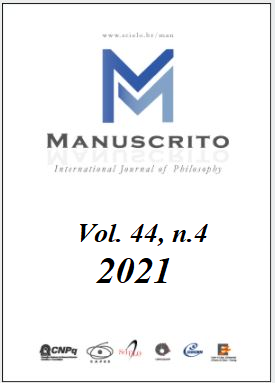Resumo
Alvin Plantinga (1993a, 1993b, 2000) argues that de jure objections to theism depend on de facto objections: in order to say that belief in God is not warranted, one should first assume that this belief is false. Assuming Plantinga’s epistemology and his de facto/de jure distinction, In this essay, I argue that to show that belief in miracles is not warranted, one must suppose that belief in miracles is always false. Therefore, a person who holds a skeptical position regarding miracles must choose either to find evidence that all of the supposed miracles are false, or admit that one is assuming an areligious commitment as a starting point.
Referências
Alexander, D. (2017). Miracles and science. Faraday Papers. Cambridge: The Faraday Institute for Science and Religion.
Corner, D. (2005). Miracles. Internet Encyclopedia of Philosophy (online).
Da Silva, G. B., & Bertato, F. M. (2019). A first-order modal theodicy: God, evil, and religious determinism. South American Journal of Logic, 5(1), 49-80.
Da Silva, G. B. (2020). An axiomatic approach to theodicy via formal applied systems. Master Thesis in Philosophy, University of Campinas.
Greco, J. (2018) Transmitting faith and garbage. European Journal for Philosophy of Religion, 10 (3), 85-104.
Hume, D. (1748/1975). Enquiries Concerning Human Understanding and Concerning the Principles of Morals. Oxford: Oxford University Press.
McGrew, T. (2019). Miracles. Stanford Encyclopedia of Philosophy (online).
Moon, A. (2016). Recent work in reformed epistemology. Philosophy Compass 2016; 11: 879-891.
Moon, A. (2020). Circular and question-begging responses to religious disagreement and debunking arguments. Philosophical Studies. doi:10.1007/s11098-020-01458-3
Morris, W., & Brown, C. (2019). David Hume. Stanford Encyclopedia of Philosophy (online).
Novum Testamentum Graece (2012). Nestle-Aland. 28th ed. Stuttgart: Deutsche Bibelgesellschaft.
Plantinga, A. (1993a). Warrant: The Current Debate, Oxford: Oxford University Press .
Plantinga, A. (1993b). Warrant and proper function. New York: Oxford University Press.
Plantinga, A. (2000). Warranted Christian belief. New York: Oxford University Press .
Plantinga, A. (2015). Knowledge and Christian belief. Grand Rapids: Eerdmans.
Swinburne, R. (2003). The resurrection of God incarnate. Oxford: Oxford University Press .
The Holy Bible, New International Version (1984). Grand Rapids: Zondervan.
Wright, N. T. (2003). The resurrection of the Son of God. Fortress Press.
Wykstra, S. (2002). ‘Not done in a corner’: how to be a sensible evidentialist about Jesus. Philosophical Books, 2, 92-116.
Wykstra, S. (2019). Warranted Christian resurrection belief: sensible evidentialism, communitarianism, and Plantinga's diffident dilemma, or: a tale of two models. Unpublished; available here.

Este trabalho está licenciado sob uma licença Creative Commons Attribution 4.0 International License.
Copyright (c) 2021 Manuscrito: Revista Internacional de Filosofia


